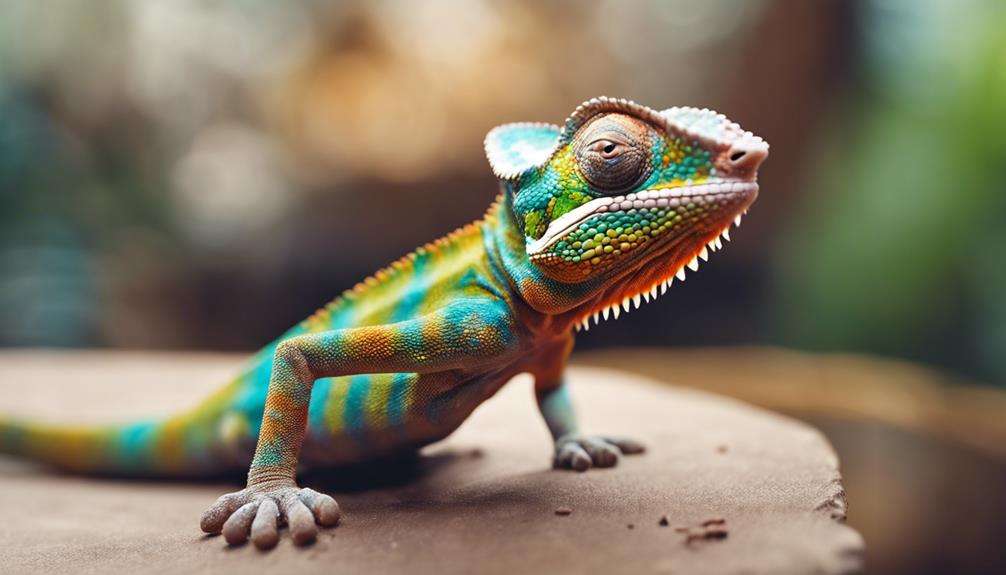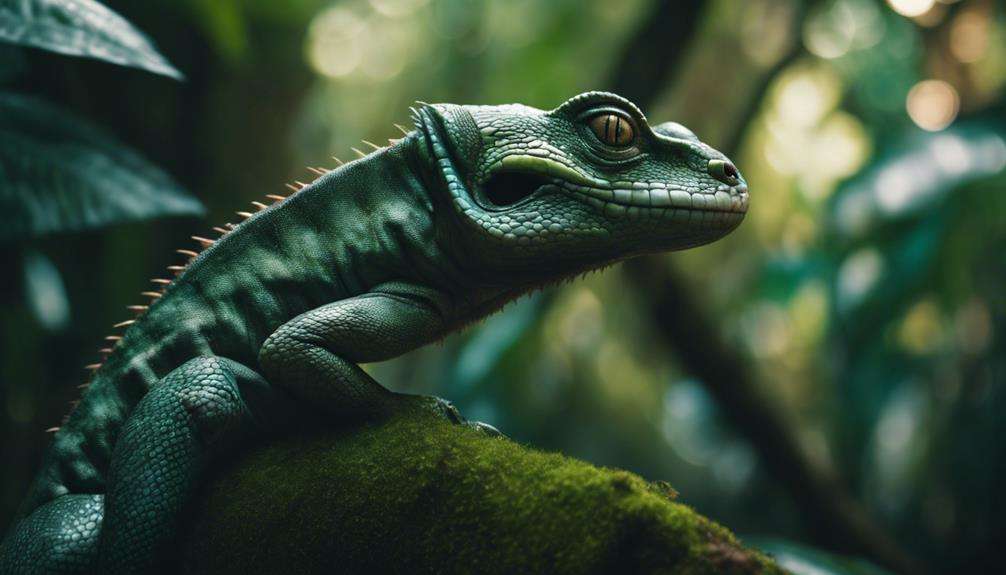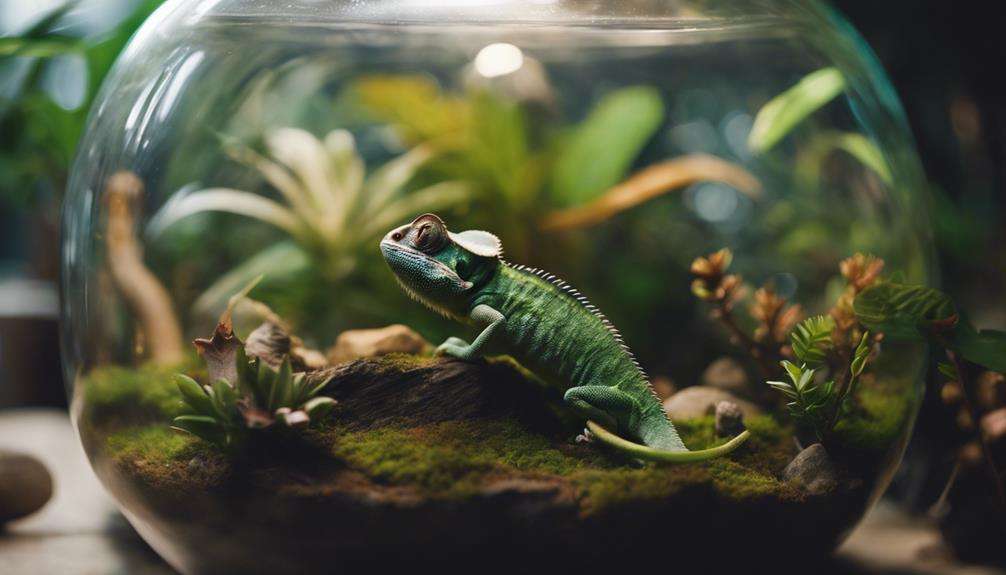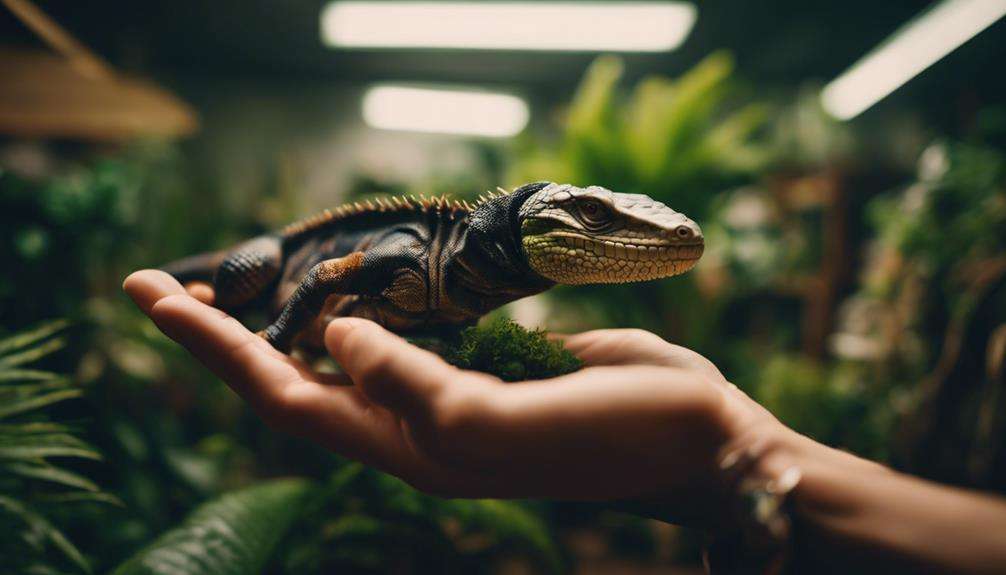Imagine owning a rare reptile is like having a precious gem in your care – delicate, unique, and deserving of special attention. As you navigate the intricate world of exotic reptile care, there are key strategies that can make all the difference in your companion's well-being.
From creating a habitat mirroring their natural environment to mastering the art of dietary balance, each aspect plays a vital role in their thriving existence.
Stay tuned to unravel the secrets of providing top-notch care for these extraordinary creatures.
Key Takeaways
- Create naturalistic enclosures with proper lighting and substrates for rare reptiles.
- Tailor diets with supplements, varied food, and expert advice for optimal health.
- Prioritize preventive care with regular check-ups, tests, and species-specific husbandry.
- Ensure mental stimulation, safe handling, disease prevention, and emergency preparedness for rare reptiles.
Housing for Rare Reptiles
When housing rare reptiles, ensuring their enclosures replicate their natural habitats is crucial for their health and well-being. Customized enclosures play a significant role in providing the necessary environmental conditions for these unique creatures. These enclosures should include features such as hiding spots, climbing structures, and basking areas to mimic their natural habitat. Reptiles, by nature, have diverse habitat requirements, and it's essential to cater to these specific needs within the enclosure.
Temperature and humidity levels within the enclosure must be closely monitored and adjusted according to the requirements of the rare reptile species. Specialized lighting fixtures can also be beneficial in replicating natural sunlight, which is crucial for the overall well-being of these reptiles. Additionally, offering a variety of substrate options within the enclosure can help meet the unique needs of different rare reptile species. Providing a habitat that closely resembles their natural environment is key to ensuring the health and happiness of rare reptiles in captivity.
Proper Diet and Nutrition
When caring for rare reptiles, feeding schedules play a crucial role in maintaining their health and well-being. Selecting nutrient-rich food options is essential to meet your reptile's specialized dietary needs.
Additionally, incorporating dietary supplements may be necessary to ensure your rare reptile receives all essential nutrients for optimal health.
Feeding Schedule Importance
To ensure the optimal health and well-being of rare reptiles, it's crucial to establish a feeding schedule that aligns with their specific dietary requirements and nutritional needs. Rare reptiles may have unique dietary needs that differ from more common species, so researching their natural diet is essential.
Consult with a herpetologist or exotic veterinarian to create a suitable feeding schedule tailored to your rare reptile. Monitoring their feeding habits closely is necessary to ensure they're consuming the right nutrients. It's important to adjust the feeding schedule based on factors like age, size, and activity level to promote optimal health.
Maintaining a consistent and appropriate feeding routine is key to the care and well-being of these special reptiles.
Nutrient-Rich Food Choices
Establishing a nutrient-rich diet is essential for rare reptiles to thrive and maintain optimal health. When it comes to exotic pet care, proper nutrition is crucial. Follow these guidelines for providing the best diet for your rare reptile:
- Research Natural Diet: Investigate the specific dietary needs of your rare reptile species to ensure they receive appropriate nutrition.
- Offer Variety: Include a mix of insects, fruits, and vegetables to provide essential vitamins and minerals.
- Professional Consultation: Seek advice from exotic animal nutritionists or herpetologists for tailored diet plans based on your reptile's requirements.
- Balance is Key: Avoid overfeeding and strive for a balanced diet to support the overall health of your rare reptile.
Dietary Supplements Necessity
The necessity of dietary supplements for rare reptiles can't be overstated, particularly for preventing metabolic bone disease. Rare reptiles, due to their specific dietary requirements, may not obtain all essential nutrients solely through regular feeding.
Calcium and vitamin D3 supplements are crucial for maintaining proper bone health in rare reptiles. Consulting with a reptile specialist or veterinarian is essential to determine the specific supplements required for rare reptiles. Some rare reptiles may even need specialized vitamin supplements to address their unique nutritional needs adequately.
Ensuring proper supplementation is vital to guarantee that rare reptiles receive the necessary nutrients for their overall health and well-being. Remember, a well-balanced diet combined with appropriate dietary supplements is key to keeping rare reptiles healthy.
Temperature and Humidity Control
Maintaining precise temperature gradients is crucial for the health and well-being of rare reptiles, as they may have specific temperature requirements based on their natural habitat. When caring for these unique creatures, it's essential to pay close attention to temperature and humidity control.
Here are some key tips to help you provide the best environment for your rare reptile:
- Understand Specific Requirements: Research and understand the specific temperature and humidity needs of your rare reptile species.
- Monitor Conditions: Regularly check and adjust temperature and humidity levels using reliable gauges to ensure they're within the optimal range.
- Mimic Native Environment: Create an environment that closely mimics the natural habitat of the rare reptile, adjusting temperature and humidity accordingly.
- Seek Expert Advice: Consult with experienced experts or breeders familiar with the species to fine-tune the temperature and humidity control for your rare reptile's well-being.
Veterinary Care for Exotic Reptiles
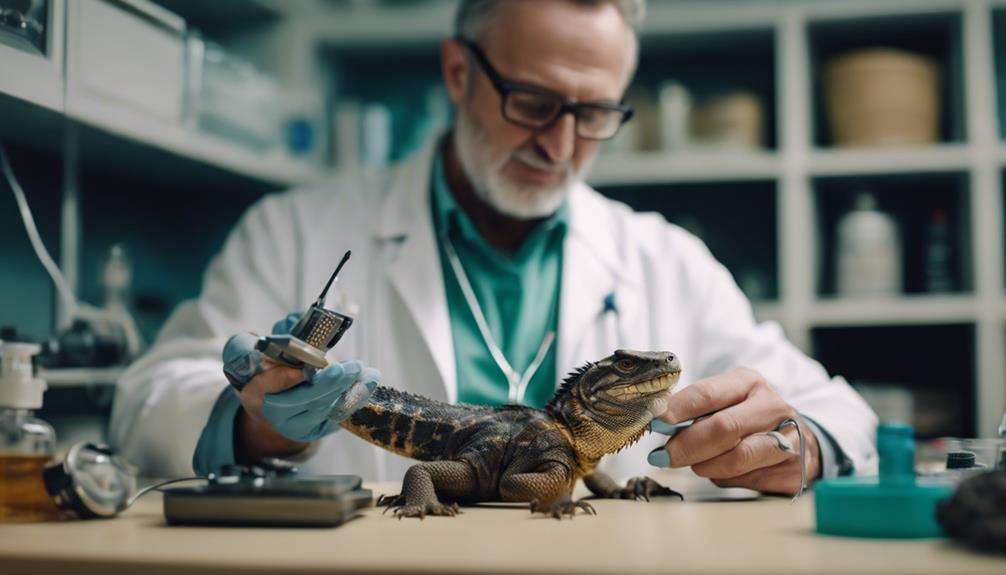
Exotic reptiles necessitate specialized veterinary attention for their distinctive health requirements, which can differ greatly from those of more common pets.
Regular health check-ups with a herp veterinarian are crucial for the early detection and treatment of potential health issues in rare reptiles.
Diagnostic procedures like blood screenings and fecal exams play a vital role in assessing the well-being of exotic reptiles and ensuring their long-term health.
Reptile Health Check-Ups
How can you ensure the optimal health of your rare reptile through regular veterinary check-ups? Regular health check-ups by a herp vet are essential for the well-being of wild and exotic reptiles. Here are key steps to maintain your reptile's health:
- Routine Exams: Schedule regular health check-ups to detect any issues early.
- Post-Purchase Evaluation: Assess your reptile's health status and care practices post-purchase.
- Diagnostic Tests: Conduct fecal exams and blood screenings for a comprehensive health evaluation.
- Record-Keeping: Maintain detailed records of husbandry practices to aid in tailored care.
Specialized Reptile Treatments
To ensure the optimal health and well-being of your rare reptile, specialized veterinary care tailored to their unique needs is crucial. Exotic reptiles require the expertise of reptilian and amphibian veterinarians who understand their specific health requirements. These professionals are equipped to perform specialized diagnostics such as radiographs, blood tests, and fecal exams to assess the health of exotic animals accurately.
Treatment for rare reptiles may involve the administration of specialized medications, surgical procedures, and advanced imaging techniques like CT scans or endoscopy. Reptile-savvy veterinarians are well-versed in the dietary, environmental, and behavioral needs of exotic animals, ensuring they receive the best possible care.
Regular check-ups and preventive care play a vital role in maintaining the health and well-being of rare reptiles in captivity.
Preventive Reptile Care
Regular veterinary care plays a crucial role in maintaining the health and well-being of rare reptiles, ensuring early detection and management of any potential health issues. When it comes to preventive reptile care, there are several key aspects that exotic animals need to stay healthy and thrive:
- Regular Veterinary Check-ups: Schedule routine visits to monitor your reptile's health status.
- Diagnostic Tests: Utilize blood screenings and fecal exams to detect any underlying health problems.
- Detailed Husbandry History: Maintain a thorough record of your reptile's care to assist veterinarians in providing tailored treatment.
- Species Identification: Ensure proper husbandry and medical care by accurately identifying the species of your rare reptile.
Enrichment and Mental Stimulation
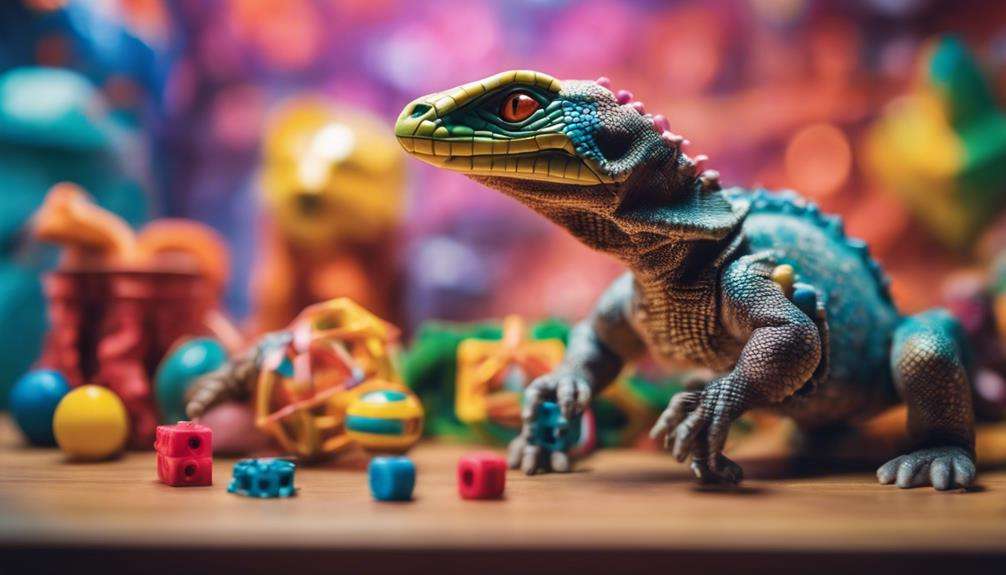
Implementing environmental enrichment is crucial for the well-being of rare reptiles, mimicking their natural habitat and providing mental stimulation. Rare reptiles benefit greatly from a diverse environment that includes hiding spots, climbing structures, and basking areas. These elements not only replicate their natural surroundings but also offer opportunities for physical activity and exploration.
Interactive toys and puzzles are essential tools for engaging rare reptiles mentally and preventing behavioral issues. Introducing new objects regularly can keep them stimulated and prevent boredom, as they're naturally curious creatures.
Supervised outdoor time is also beneficial, as it exposes rare reptiles to additional environmental enrichment and natural stimuli. This exposure can contribute to their overall mental well-being and provide them with a variety of sensory experiences.
Handling and Interaction Guidelines
When handling rare reptiles, what considerations should be made to ensure their well-being and minimize stress? Caring for reptiles, especially rare species, requires a delicate approach to handling and interaction. Here are some guidelines to help you provide the best care for these unique creatures:
- Limit Handling: Rare reptiles may be more sensitive to handling due to their limited population numbers. Only handle them when necessary for essential care tasks.
- Seek Expert Advice: Consult with experts or breeders familiar with rare reptiles for specific handling guidelines tailored to their needs. They can provide insights into the best practices for interacting with these special creatures.
- Understand Unique Behaviors: Rare reptiles may exhibit distinct behavior traits that necessitate specialized interaction approaches. Take the time to learn about their behaviors to ensure positive interactions.
- Minimize Unnecessary Handling: Avoid unnecessary handling to reduce the risk of injury or stress on rare reptiles. Limiting interactions to essential tasks can help keep them healthy and happy.
Preventing Common Reptile Diseases
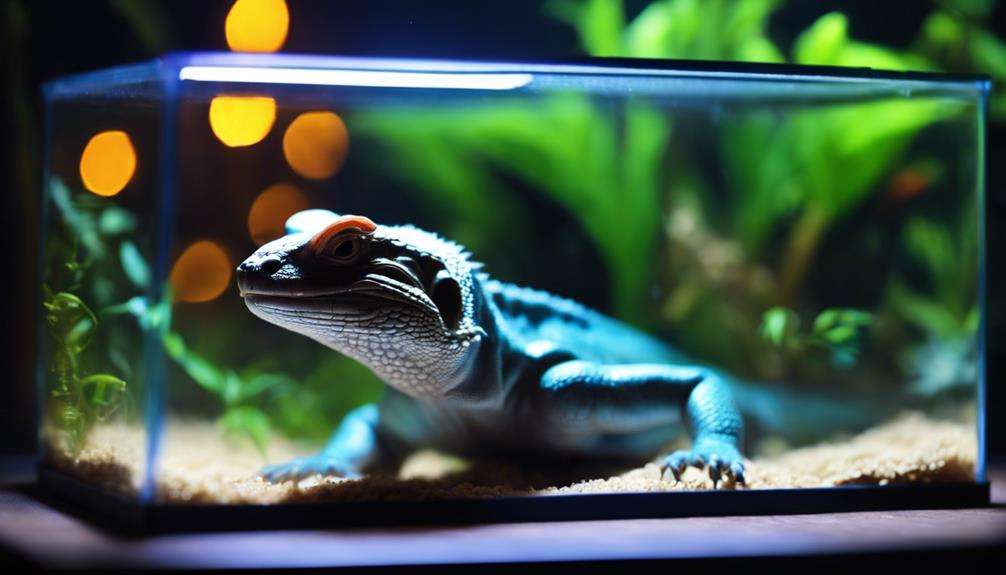
To ensure the optimal health and well-being of rare reptiles, it's crucial to proactively address and prevent common reptile diseases through diligent care practices.
Regularly cleaning and disinfecting the enclosure is essential in preventing the spread of infectious agents that can lead to illnesses.
Maintaining proper temperature and humidity levels within the enclosure is crucial to reduce the risk of respiratory infections, which are common in reptiles.
Providing a balanced diet supplemented with necessary vitamins and minerals is key to preventing metabolic bone disease, a condition that can severely impact a reptile's health.
Additionally, monitoring for signs of parasites such as mites and ticks is important to prevent skin issues and discomfort in rare reptiles.
Practicing good hygiene not only in their environment but also during handling is vital.
Prompt veterinary care is crucial if you notice any concerning symptoms to prevent and address common reptile diseases effectively.
Safe Handling of Rare Reptiles
Rare reptiles, being more sensitive to handling due to limited exposure to human contact, require specific techniques to ensure their well-being and safety. When handling these unique creatures, it's crucial to follow expert advice and best practices to maintain their good health.
Here are some essential tips for safely handling rare reptiles:
- Consult with experts: Seek guidance from professionals or breeders who've experience with rare reptiles to learn the proper handling techniques.
- Limit handling: Avoid excessive handling to reduce stress and minimize potential health issues in these wild reptiles.
- Use protective gear: Utilize gloves or tools when handling rare reptiles to prevent injuries and reduce stress for the animals.
- Provide a calm environment: Create a quiet and peaceful setting when interacting with rare reptiles to promote their well-being and ensure a positive experience for both you and the reptile.
Emergency Preparedness for Reptile Owners
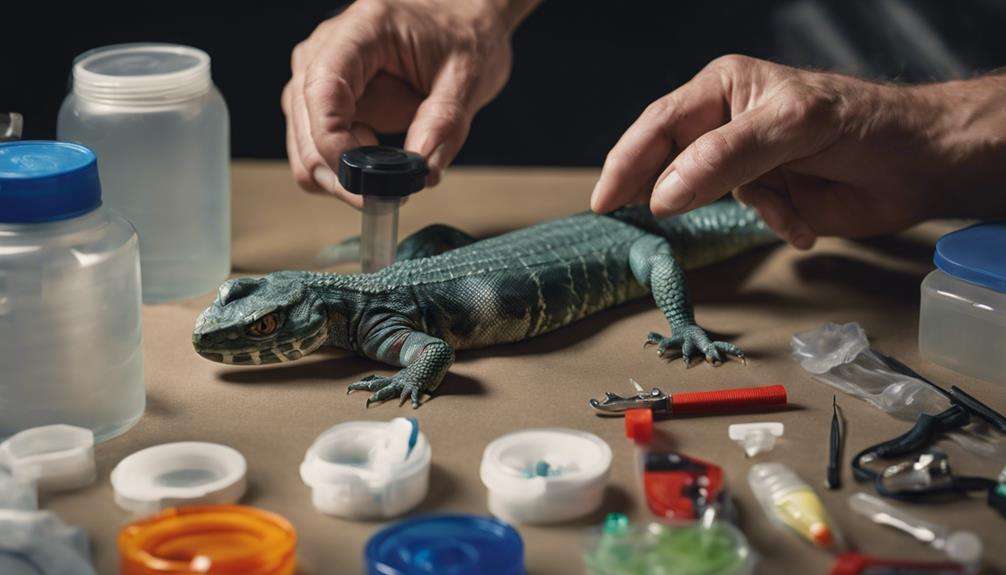
In preparing for emergencies as a reptile owner, having an essential emergency kit ready with supplies like heat packs, a thermometer, and reptile-safe first aid items is crucial. These items are vital for maintaining your reptile's health and well-being during unexpected situations.
Additionally, it's important to know the contact information for a reptile-savvy veterinarian or emergency exotic animal clinic. Familiarizing yourself with common reptile health issues and their symptoms can aid in quick identification during emergencies, enabling prompt action.
Creating a list of local reptile rescue organizations or specialists who can assist in emergencies is also recommended. Furthermore, practicing evacuation drills with your reptile is essential to ensure you can safely transport them if the need arises.
Frequently Asked Questions
How Do You Take Care of an Exotic Pet?
To care for an exotic pet, ensure you meet their unique needs. Research their diet, habitat setup, handling, and common health issues. Provide appropriate food, a well-maintained habitat, socialization, and regular vet check-ups for a healthy exotic companion.
What Are the Hardest Reptiles to Take Care Of?
When caring for the most challenging reptiles like the Ploughshare tortoise or the Santa Catalina Island rattlesnake, remember their sensitivity to stress and need for specialized diets. Overcoming common misconceptions is key.
How Do You Take Care of Reptiles?
To take care of reptiles, maintain feeding schedules, regulate habitat temperatures, and handle them properly. Ensure proper habitat maintenance and environmental conditions. Seek expert advice on specialized care tips. Create a balanced diet and mimic natural settings for optimal health.
How Do You Keep Reptiles Healthy?
To keep reptiles healthy, ensure proper nutrition, humidity levels, and environmental enrichment. Regular vet check-ups are crucial for their well-being. Maintain optimal conditions to prevent health issues and provide a thriving habitat for your unique reptilian companion.
Conclusion
Congratulations on mastering the art of caring for rare reptiles!
You've become an expert in providing the best possible care for these unique creatures, ensuring their well-being and happiness.
Remember, the irony lies in the fact that while they may be rare, with your expertise, they're in the best of hands.
Keep up the great work and continue to enjoy the rewarding experience of caring for these extraordinary reptiles.

